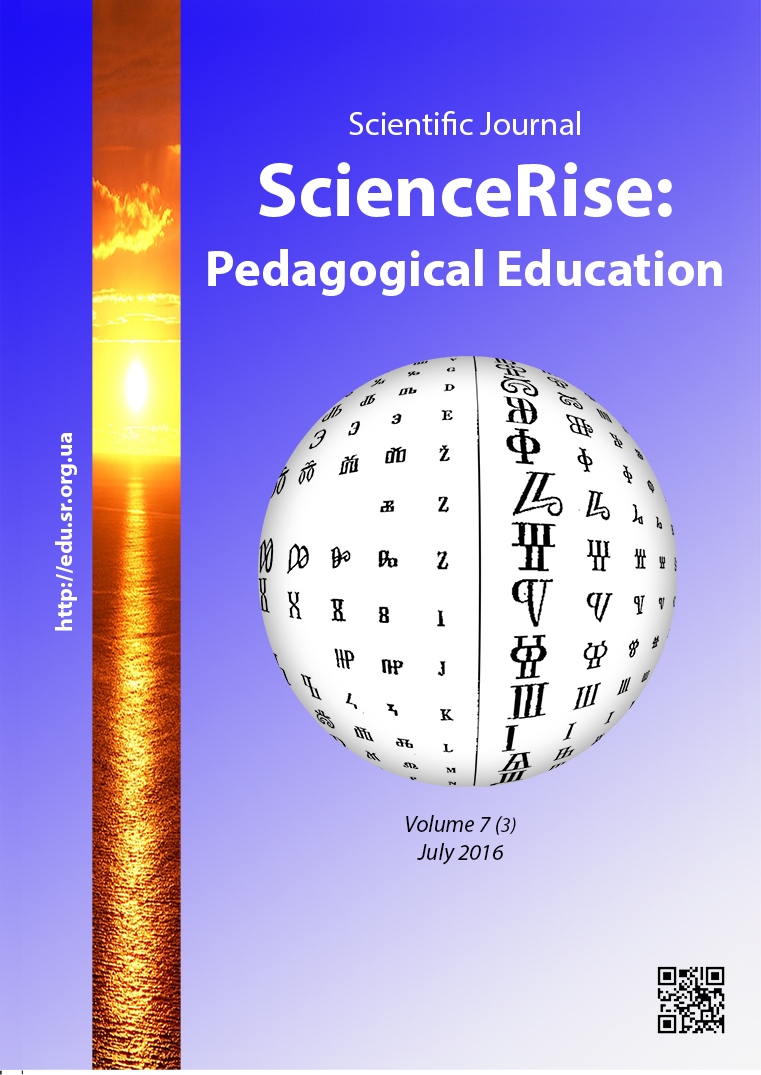The role of the teacher in construction of informational-educational environment of the school
DOI:
https://doi.org/10.15587/2519-4984.2016.73994Keywords:
educational process, organization of educational process, teacher of Informatics, informational-educational environmentAbstract
The one of basic norms of guaranteeing of formation of competences, necessary for the successful life of pupils in the modern society, is a creation of correspondent informational-educational environment. That is why the important step in realization of the aforesaid educational tendencies within educational institution is a creation of informational-educational environment (IEE) that takes into account the features and needs of the modern generation of pupils. In the article is considered the structure of informational-educational environment of Kherson physical-technical lyceum, its features and functional possibilities for the different participants of educational process with correspondent levels of access. The offered informational-educational environment is permanently improved and added with new modules of software for support of the learning process, automation of the part of processes of the institution management, cooperation with parents
References
- Spivakovsky, O. V., Petukhova, L. E., Kotkova, V. V. (2014). Filosofiia trysubiektnoi dydaktyky v systemi pidhotovky maibutnoho vchytelia pochatkovykh klasiv [Philosophy trysub'yektnoyi didactics in training future elementary school teacher at the school]. Computer and family, 3, 7–11.
- Bykov, V. Iu.; Kremen', V. G. (Ed.) (2008). Komp’iuteryzatsiia osvity. Sciences of Ukraine [Computerization of Education. Sciences of Ukraine]. Kyiv: Yurinkom Inter, 410–412.
- Protsenko, G. A. (2012). Proektuvannya InformatsIynogo prostoru zagalnoosvItnogo navchalnogo zakladu [Design of information space of educational institutions]. Kyiv, 20.
- Rakitinа, Ye., Lyskova V. (1999). Informatsionnyie polya v uchebnoy deyatelnosti [Information fields in the educational activity]. Informatics and Education, 1, 19–25.
- Ilchenko, O. (2002). Organizatsionno-pedagogicheskie usloviya setevogo obucheniya [Organizational-pedagogical conditions of the network of training]. Moscow, 190.
- Andreev, A. (2004). Nekotoryie problemyi pedagogiki v sovremennyih informatsionno-obrazovatelnyih sredah [Some problems of pedagogy in modern information and education media]. Innovations in Education, 6, 98–113.
- Yasvin, V. A. (2001). Obrazovatelnaya sreda: ot modelirovaniya k proektirovaniyu [Educational environment: from modeling to design]. Moscow: Smysl, 366.
- Shakhina, I. Y.; Tovazhnjans'kyj, L. L., Romanovs'kyj, O. G. (Eds.) (2013). Viznachennya I napryami stvorennya InformatsIynogo osvItnogo seredovischa [Determination and direction of development of information educational environment]. Problems and prospects of forming national humanitarian-technical elite. Kharkiv: NTU "HPI", 36-37 (40-41), 245–255.
- Yong-Sang, C. (2011). Diversifikatsiya uchebnyih platform [Diversification of learning platforms]. Analytical note. Moscow: UNESCO Institute for information technologies in education, 12.
- Andreev, A. A., Rubyn, Iu. V., Tytarev, L. H. (2001). The Department in the system of open education. Education in the information age. Moscow: MESY, 90–100.
- Lazareva, Y. A. Distance learning in an educational environment. Available at: http://www.iiorao.ru/iio/pages/izdat/ison/publication/ison_2012/num_10_2012/Lazareva.pdf
- Kechyev, L. N., Putylov, H. P., Tumkovskyi, S. R. Information educational environment of a technical University. CNewsAnalytyka. Available at: http://www.cnews.ru/reviews/free/edu/it_russia/institute.shtml
- Shovkun, V.; Spivakovs'kyj, O. V. (Ed.) et. al. (2015). Pidgotovka maybutnogo vchitelya Informatiki do roboti v umovah suchasnogo InformatsIyno-osvItnogo seredovischa shkoli [Training of future teacher of informatics to work in modern information and educational environment of school]. Information Technologies in Education. Kherson: Vyd-vo HDU, 23, 136–146.
Downloads
Published
How to Cite
Issue
Section
License
Copyright (c) 2016 Віталій Віталійович Шовкун

This work is licensed under a Creative Commons Attribution 4.0 International License.
Our journal abides by the Creative Commons CC BY copyright rights and permissions for open access journals.
Authors, who are published in this journal, agree to the following conditions:
1. The authors reserve the right to authorship of the work and pass the first publication right of this work to the journal under the terms of a Creative Commons CC BY, which allows others to freely distribute the published research with the obligatory reference to the authors of the original work and the first publication of the work in this journal.
2. The authors have the right to conclude separate supplement agreements that relate to non-exclusive work distribution in the form in which it has been published by the journal (for example, to upload the work to the online storage of the journal or publish it as part of a monograph), provided that the reference to the first publication of the work in this journal is included.







